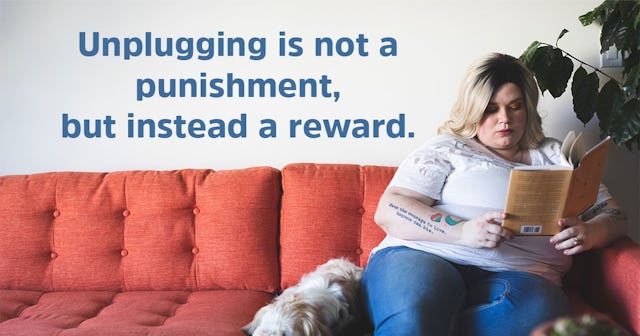Why We Choose To Do One Screen-Free Day Each Week

Ever since the World Health Organization (WHO) declared COVID-19 a pandemic and schools shut down and millions of people were sent to work from home, my kids—and I—have been on screens more hours than I’d like to admit.
The first Sunday morning after a week of practicing social distancing, when Apple notified me of my average phone use during the day, I cringed. And then I vowed to never tell anyone exactly how many hours I’d spent on my phone. And then I shared my first meme ever on social media—regarding social distancing from my phone. Which I absolutely did not do.
Screen time is a necessary part of life while we all practice social distancing. Screens have become the way my kids do school, the way I teach Pilates classes, and the way we all socialize and “look at a face that doesn’t live in this house,” as my eight-year-old son so eloquently said when he explained to me why he needs to FaceTime.
And then there’s the other need for screens. Video games, movies, endless Netflix series are a way to pass the time. Reading breaking news alerts and think pieces on the pandemic are ways to keep me informed about the crisis, and being informed gives me a microscopic sense of control in a world that feels completely chaotic. As a single mom, I’m relying more than ever on screens to either allow me to work, or simply to have a moment to think without the word “mommy” being screamed from some corner of the house.
Josh Applegate/Unsplash
Before the pandemic, I’d been trying (not necessarily successfully) to limit screen time—for my kids and for myself. For good reasons, too. My kids’ posture was suffering from curving over an iPad, their ability to entertain themselves had all but disappeared, and, with a screen in their faces, they seemed completely tuned out from real life.
Ever since social distancing, those limits are long-forgotten, relics of a former life when going to the grocery store wasn’t a mission fraught with anxiety.
But as my family heads into our fourth week of social distancing, and as the end date to our self-quarantine remains entirely uncertain, finding a way to take some time away from screens may be more important than ever.
Scary Mommy interviewed Tiffany Shlain, author of 24/6: The Power of Unplugging One Day a Week, who has been implementing a screen time break for her family for the past ten years. For one day a week, from Friday night to Saturday night, her entire family—adults and kids—turns off their phones and completely unplugs.
Amazon
The idea seems almost impossible—especially in the middle of a pandemic. With information arriving at breakneck speeds and alerts lighting up phones too many times a day — with kids home and away from their usual activities and chances to socialize — it seems too hard to remain simply disconnected. Even without a pandemic, there’s a more than good chance that my kids would revolt if I said they couldn’t look at a screen for a full twenty-four hours.
But maybe that’s because we’re thinking of unplugging in the wrong way. Maybe unplugging isn’t a chore or a punishment. (Am I the only one who’s threatened to take away screens for a week during the pandemic?) Maybe the answer is to reframe our thinking.
Shlain describes feeling “set free” during those hours in which she consciously unplugs. Her children, including her 17-year-old, similarly look forward to that screen-free day. Each member of her family uses the screen free time to decide what they really want more of as a family, and everyone’s needs are heard and met.
Unplugging is not a punishment, but instead a reward. One that allows for more creativity, and a way to distinguish time during these quarantine days, which seem to blend together without the normal ebb and flow of weekday versus weekend schedules.
Without the lure of the phone and the stress of the next news alert, Shlain and her family have Friday night dinners in which they can engage in deeper conversation. They sleep better on Friday night and can read a book without distraction. When the inevitable “I’m bored” whine arrives, Shlain says a burst of creativity always follows after—both for herself, and for her children. Because as it turns out, being bored isn’t a bad state that needs to be fixed. Shlain believes that “creativity comes from bored” and being bored is actually a “runway to creativity.”
Shlain instituted a “no screen time for 24 hours” rule after two back-to-back life events left her reeling. She says, “Life was grabbing me on the shoulders to focus on what matters because I was feeling distracted and never present.” In her opinion, this pandemic is also life grabbing us by shoulders and telling us to focus on what really matters: our family and our health.
In her book, she offers suggestions of activities for all ages to engage in while unplugging, but one activity that might be good for the whole family is simply journaling. These days are days that will be inscribed forever into history books. We’re living history now. One day we all will be the storytellers and history keepers, and conversations may always drift back to what did you do when.
Turning off the laptops, putting pen to paper (or maybe for younger kids, crayon to paper) and paying attention to what’s happening around you, to what you’re feeling and thinking, is valuable.
Giving yourself a chance to look up—away from the screen, toward your family—is valuable. Especially in a world where our health and our family have never been more important.
This article was originally published on